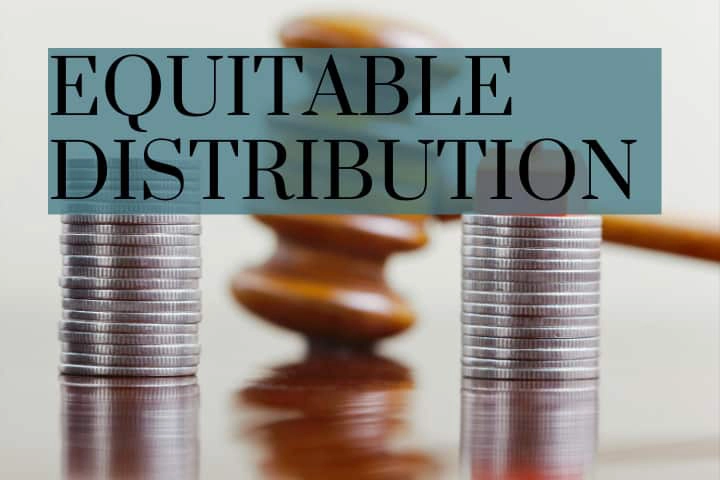Relocating children in a divorce is a complicated and difficult issue. Raleigh divorce lawyer, Glenn…
Divorce is a challenging and emotionally charged process, and when it comes to separating marital assets and property, it can become even more complex. In the state of North Carolina, equitable distribution laws govern the division of property and assets during divorce proceedings.
Understanding the ins and outs of North Carolina's equitable distribution laws is crucial for anyone facing divorce in the Tar Heel State. At Doyle Divorce Law, our team of Raleigh family law divorce attorneys specializes in guiding individuals through the complexities of divorce and equitable distribution.

What is Equitable Distribution in a Divorce?
Equitable distribution refers to the method used by the courts to divide property and assets acquired during a marriage when a couple decides to divorce. Unlike some other states that follow community property principles (where assets are divided equally), North Carolina follows the principle of equitable distribution.
This means that the court aims to distribute marital property in a manner it deems fair and equitable, which may or may not result in a 50/50 split. The goal is to achieve a distribution that considers various factors, allowing for flexibility and fairness in each unique case.
Understanding Marital vs. Separate Property
One of the fundamental aspects of equitable distribution divorces in North Carolina is the distinction between marital and separate property. Understanding this distinction is vital to ensure fairness of dividing property and other assets during divorce negotiations.
What is Marital Property?
Marital property primarily includes assets and debts acquired by either spouse during the course of the marriage.
This encompasses a wide range of items, such as:
- Income and Earnings: All income earned by either spouse during the marriage, including salaries, bonuses, and business profits, is considered marital property.
- Real Estate: Homes, land, and other real properties purchased or acquired during the marriage fall into this category.
- Investments: Any investments, such as stocks, bonds, or retirement accounts, initiated or augmented during the marriage are typically classified as marital property.
- Personal Property: Items like furniture, vehicles, artwork, and other possessions purchased or acquired during the marriage are subject to division.
What is Separate Property?
Separate property consists of assets and debts that are considered individual and owned by one spouse exclusively.
Key elements of separate property include:
- Pre-Marital Assets: Any property owned by either spouse before the marriage is generally considered separate property. This includes real estate, investments, personal belongings, and savings.
- Inheritance and Gifts: Assets acquired through inheritance or gifts to one spouse, whether before or during the marriage, are typically considered separate property.
- Property Acquired Post-Separation: Any property acquired by either spouse after the date of separation is typically treated as separate property.
What is Commingling?
Commingling is a financial term that refers to the mixing or blending of separate property with marital or community property. In the context of divorce and property division, it typically means that assets or funds that were originally considered separate property have become combined with marital property, making it challenging to distinguish and separate them during divorce proceedings.
This can happen in various ways, such as:
- Depositing separate funds into a joint bank account shared by both spouses.
- Using separate funds to pay for marital expenses, such as mortgage payments, utility bills, or joint vacations.
- Investing separate assets in jointly owned businesses or properties.
- Using proceeds from the sale of separate property to acquire marital property.
Commingling can blur the lines between separate and marital property, potentially leading to disputes during divorce proceedings.
Factors Considered in Equitable Distribution
Equitable distribution in North Carolina involves careful consideration of various factors to determine how marital property and assets should be divided between spouses. These factors aim to ensure a fair and just distribution based on the unique circumstances of each case.
Duration of the Marriage
The length of the marriage is a critical factor in equitable distribution. Longer marriages typically result in a more balanced distribution of assets, as the contributions and sacrifices made during a lengthy union are often significant.
Financial Contributions of Each Spouse
Each spouse's financial contributions to the marital estate are considered. This includes income earned, investments made, and debts incurred. The court assesses how each spouse contributed to the acquisition and maintenance of marital assets.
Non-Financial Contributions
Non-financial contributions are equally important when it comes to dividing marital property. These contributions encompass homemaking, child-rearing, support for the other spouse's career or education, and any other non-monetary efforts that contribute to the marriage's well-being.
Standard of Living During the Marriage
The lifestyle enjoyed by the couple during the marriage is examined. The court aims to enable both spouses to maintain a similar standard of living post-divorce to the extent possible.
Economic Circumstances of Each Spouse Post-Divorce
The financial situation and needs of each spouse after the divorce are taken into account. Factors such as earning potential, employability, and future financial prospects are considered when determining equitable distribution.
Custodial Arrangements and Needs of Children
If there are children involved, the custody arrangements and the financial needs of the children play a role in the property division. The court aims to ensure that custodial parents can adequately provide for the children's well-being.

The Role of Prenuptial Agreements in Equitable Distribution
Prenuptial agreements (prenups) are legal documents that couples can enter into before marriage to define how their property and assets will be divided in the event of divorce. These agreements can play a significant role in equitable distribution.
Binding Agreements
A well-drafted prenuptial agreement can outline how specific assets and debts will be categorized and divided, potentially superseding the default equitable distribution laws in North Carolina.
Preservation of Separate Property
Prenups can protect assets that would otherwise be considered separate property, ensuring that they remain the exclusive property of the individual who brought them into the marriage.
Clarity and Predictability
Prenuptial agreements provide clarity and predictability in the event of divorce, reducing the potential for disputes over property division.
The Equitable Distribution Process
The equitable distribution process in North Carolina is a structured legal procedure designed to fairly divide marital property and assets during divorce. Let's break down the various stages involved in this process and the crucial role played by family law attorneys.
Filing for Equitable Distribution
The equitable distribution process begins when one spouse files a request for equitable distribution as part of their divorce proceedings. This formal request sets the legal machinery in motion to determine how marital property should be divided. The court will require a detailed list of assets, debts, and financial information from both parties.
Discovery Phase
During this stage of the equitable distribution divorce process, both spouses, with the assistance of their respective attorneys, gather and exchange relevant information about their financial circumstances. This information includes bank statements, tax returns, real estate documents, business records, and any other documentation related to marital property. The discovery phase is crucial for ensuring that all marital assets are identified and valued accurately.
Mediation or Negotiation
Many equitable distribution cases in North Carolina are resolved through mediation or negotiation before proceeding to trial. Mediation involves a neutral third party (the mediator) who helps the spouses reach a mutually agreeable settlement. Negotiation may occur between the spouses and their attorneys, working collaboratively to reach a fair distribution agreement. This stage allows for flexibility and the opportunity for both parties to have a say in the outcome.
Trial if Necessary
If mediation and negotiation fail to yield an agreement, the case may proceed to trial. During the trial, both parties present their arguments and evidence before a judge. The judge will then make a final determination on the equitable distribution of marital property based on the evidence and applicable North Carolina laws.
Role of a Family Law Attorney in Guiding Clients Through the Process
Engaging the services of an experienced divorce attorney is essential for anyone navigating the complex equitable distribution process.
Here's how these legal professionals can be invaluable:
- Legal Expertise: Family law attorneys specialize in divorce and equitable distribution laws, ensuring that their clients understand their rights and obligations.
- Advocacy: Attorneys advocate for their clients' interests during negotiations, mediation, and trial, striving to secure the best possible outcome.
- Document Preparation: Attorneys assist in gathering, organizing, and presenting financial documents and evidence to support their client's case.
- Negotiation Skills: Attorneys are skilled negotiators who can work toward a settlement that aligns with their client's goals and priorities.
- Litigation Representation: In cases that proceed to trial, family law attorneys represent their clients in court, presenting a compelling case and advocating for a fair distribution of assets.
Contact Our Raleigh Equitable Distribution Lawyers Today
Are you facing divorce and need expert guidance on equitable distribution in Raleigh, North Carolina? Don't navigate this complex process alone. Take the first step towards securing your financial future and protecting your rights by contacting our experienced equitable distribution lawyers at Doyle Divorce Law.
Our team specializes in family law, and we have a proven track record of helping clients achieve fair and just outcomes in their divorce cases. We understand the intricacies of North Carolina's equitable distribution laws and can provide the personalized support and legal expertise you need.
Contact us today by calling (919) 301-8843 or filling out the form below to get started.



